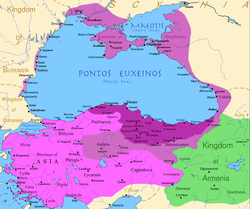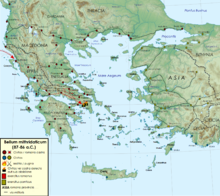
Back حروب ميثراداس Arabic مهرداد ساواشلاری AZB Митридатови войни Bulgarian Brezelioù Mithridates Breton Guerres Mitridàtiques Catalan Mithridatische Kriege German Μιθριδατικοί πόλεμοι Greek Guerras mitridáticas Spanish Gerra Mitridatiko Basque جنگهای مهردادی Persian
| Mithridatic Wars | |||||||||
|---|---|---|---|---|---|---|---|---|---|
 The Pontic Kingdom | |||||||||
| |||||||||
| Belligerents | |||||||||
| Roman Republic amid civil war | Kingdom of Pontus and momentary allies | ||||||||
| Commanders and leaders | |||||||||

The Mithridatic Wars were three conflicts fought by Rome against the Kingdom of Pontus and its allies between 88 – 63 BC. They are named after Mithridates VI, the King of Pontus during the course of the wars who initiated the hostilities after annexing the Roman province of Asia into its Pontic Empire (that came to include most of Asia Minor) and committing massacres against the Roman inhabitants there. Mithridates was able to organise revolts against advancing Roman troops and play off the political factions of the optimates and populares against one another in the Roman civil wars. Nevertheless, the first war ended with a Roman victory, confirmed by the Treaty of Dardanos signed by Sulla and Mithridates. Greece was restored to Roman rule and Pontus was expected to restore the status quo ante bellum in Asia Minor.
As the treaty of Dardanos was barely implemented in Asia Minor, the Roman general Murena (in charge of retaking control of Roman territory in Asia) decided to wage a second war against Pontus. The second war resulted was inconclusive and gave momentum to Mithridates, who then forged an alliance with Tigranes the Great, the Armenian King of Kings. Tigranes was the son-in-law of Mithridates and was in control of an Armenian empire that included territories in the Levant. Pontus won the Battle of Chalcedon (74 BC), gave support to Cilician pirates against Roman commerce, and the third war soon began.
For the third war, the Romans sent the consul Lucullus to fight against Armenia and Pontus. Lucullus won the Battle of Cabira and the Battle of Tigranocerta, but this progress was halted following the Battle of Artaxata and the Battle of Zela. Meanwhile, the campaign of Pompey against the Cilician pirates in the Mediterranean was successful and Pompey was named by the Senate to replace Lucullus. Pompey's subsequent campaigns caused the collapse of the Armenian Empire in the Levant (with Roman forces taking control of Syria and Judea) and the affirmation of Roman power over Anatolia, Pontus and nearly all the eastern Mediterranean. Tigranes surrendered and became a client king of Rome. Hunted, stripped of his possessions, and in a foreign country, Mithridates had a servant kill him. His former kingdom was combined with one of his hereditary enemies, Bithynia, to form the province of Bithynia and Pontus, which would forestall any future pretender to the throne of Pontus.
© MMXXIII Rich X Search. We shall prevail. All rights reserved. Rich X Search